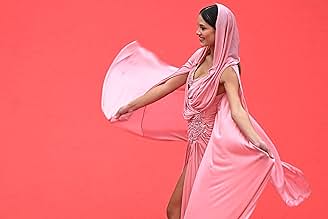VALUTAZIONE IMDb
7,7/10
17.577
LA TUA VALUTAZIONE
Un giovane insegnante spera di essere assegnato a Istanbul dopo il servizio obbligatorio in un piccolo villaggio.Un giovane insegnante spera di essere assegnato a Istanbul dopo il servizio obbligatorio in un piccolo villaggio.Un giovane insegnante spera di essere assegnato a Istanbul dopo il servizio obbligatorio in un piccolo villaggio.
- Regia
- Sceneggiatura
- Star
- Premi
- 15 vittorie e 10 candidature totali
Recensioni in evidenza
Turkish director Nuri Bilge Ceylan is probably the most confrontationally ambitious filmmaker working today. This doesn't necessarily make him the best. Indeed, there are times when you can feel him reaching for a greatness that the likes of Arichitapong Weerasthakul or Bela Tarr make seem easy. Nonetheless, Ceylan takes on the "Big Themes" with a Herculean boldness. He's the "old school great film artist" of today. His work sometimes feels like it belongs more in the era of Bergman or Bresson than today, but that doesn't make it any less impressive.
Ceylan's new film, "About Dry Grasses", is one of his best. The main character, Samet (played by Deniz Celiloglu in an at times overly intense performance), incarnates many of Ceylan's consistent concerns. Like many of the director's characters he is a secular intellectual, or at least he is striving to be one, to throw off the non-secular culture around him. In this, these characters reflect Turkey itself, a predominantly geographically and culturally Asian, Muslim nation that, since the inception of its modern state, has openly striven to become a secular, European one. He thinks too much, which is not to say too well, but this thoughtfulness is often a disguise or an excuse for a resentful selfishness.
Indeed, Samet is one of Ceylan's least likable main characters. At times, his actions disgust us. But the wisdom of the film comes with the acknowledgement that the decisions made by this quasi-anti-villain do not, in fact, amount to actual villainy. Samet is not who he, or we, wish him to be. But neither is humanity, or the world it inhabits. Time, the fact that life literally goes on despite our intentions, bestows on the living the transformative ability to apologize and forgive. (Hannah Arendt would, I think, have liked this movie.)
Ceylan is one of cinema's greatest landscape artists. Although "About Dry Grasses" consists mostly of interiors, the exterior scenes are breath taking. The small village Samet teaches in is supposed to be bleak and ugly and in some sense it is. But there is a sublimity to the revelation of these monotonous snow-scapes. Ceylan's landscapes give his films a singularly sensual quality. A viewer feels the chill of the town and the relief of a building with central heating or, to a less relieving degree, a fire, stove, or cup of hot tea. When winter finally breaks it seems a kind of existential reprieve.
One last note, while this is very much Samet's story, Celiloglu's is not the film's best performance. That goes to the Cannes-award-winning Merve Dizdar, whose performance is as smoldering as that of Celiloglu's, but also decidedly more restrained. The supporting cast, including young Ece Bagci, are generally excellent.
Ceylan's new film, "About Dry Grasses", is one of his best. The main character, Samet (played by Deniz Celiloglu in an at times overly intense performance), incarnates many of Ceylan's consistent concerns. Like many of the director's characters he is a secular intellectual, or at least he is striving to be one, to throw off the non-secular culture around him. In this, these characters reflect Turkey itself, a predominantly geographically and culturally Asian, Muslim nation that, since the inception of its modern state, has openly striven to become a secular, European one. He thinks too much, which is not to say too well, but this thoughtfulness is often a disguise or an excuse for a resentful selfishness.
Indeed, Samet is one of Ceylan's least likable main characters. At times, his actions disgust us. But the wisdom of the film comes with the acknowledgement that the decisions made by this quasi-anti-villain do not, in fact, amount to actual villainy. Samet is not who he, or we, wish him to be. But neither is humanity, or the world it inhabits. Time, the fact that life literally goes on despite our intentions, bestows on the living the transformative ability to apologize and forgive. (Hannah Arendt would, I think, have liked this movie.)
Ceylan is one of cinema's greatest landscape artists. Although "About Dry Grasses" consists mostly of interiors, the exterior scenes are breath taking. The small village Samet teaches in is supposed to be bleak and ugly and in some sense it is. But there is a sublimity to the revelation of these monotonous snow-scapes. Ceylan's landscapes give his films a singularly sensual quality. A viewer feels the chill of the town and the relief of a building with central heating or, to a less relieving degree, a fire, stove, or cup of hot tea. When winter finally breaks it seems a kind of existential reprieve.
One last note, while this is very much Samet's story, Celiloglu's is not the film's best performance. That goes to the Cannes-award-winning Merve Dizdar, whose performance is as smoldering as that of Celiloglu's, but also decidedly more restrained. The supporting cast, including young Ece Bagci, are generally excellent.
An absolute masterpiece! I'm tempted to give it five stars, but I'll determine that upon rewatch. About Dry Grasses is a powerful, albeit quiet tale that explores the pursuit of meaning and the lack of control in life, told from the singular lens of a bored and self-absorbed man trapped in a teaching position. In its bloated three-hour runtime, Ceylan seems to simulate the monotonous quality of rural life and brings an authentic personality and candidness to the characters by means such as using minimal music, featuring prolonged scenes, etc. Some might consider this relentless realism as boring, but the script isn't short of emotionally riveting moments and has a slight wittiness and humorousness in the dialogue that makes it very entertaining to sit through. Obviously, all the performances are tremendous and the beautiful cinematography highlights the alienation and oppression that characters must feel. Especially with Deniz Celiloglu, who threads a fine line between angst and friendliness yet always earns the audience's empathy despite his questionable behaviour. More than a mere narrative, About Dry Grasses serves as a profound character study, beckoning us into Samet's psyche, while simultaneously encouraging us to critique him. Ultimately, About Dry Grasses works as a film about the fragility of friendship, the perils of narcissism and serves as a cautionary tale on not letting our human nature detract from our appreciation of life. This is definitely one of the best films of 2023 that I've watched so far, and also one of the most underrated.
While I'm not accustomed to writing reviews, I feel compelled to share my thoughts on this film. The experience leaves me with mixed emotions. Visually, it's undeniably stunning, but the narrative's prolonged nature leaves a somewhat unpleasant aftertaste. With a runtime of 3 hours, the first two are rather tedious, contrasting sharply with the spectacular final hour. This is perhaps the most disappointing thing about the movie because it's well seen that this has potential. The final hour stands out as one of the best cinematic experiences I've had, but it's the initial two hours that fail to captivate. The slow pace, extended duration, and occasional loss of coherence contribute to my reservations.
Regarding the characters, the protagonist is remarkably selfish, self-centered, and outright unpleasant to others. While I appreciate the appeal of characters challenging viewers' perspectives, personally, I struggle to enjoy a narrative with such a malevolent main character. This character type represents the one I find most detestable.
In terms of character impact, none, except for the woman, left a significant impression on me. She undeniably stands out as the most intriguing character in the entire movie. The final scene, where she confronts her friend, emerges as one of the most impactful moments in the film.
Despite being a polarizing film that either garners love or disdain, I encourage individuals to give it a chance. Maybe not solely for the characters or the storyline, but there's a potential for valuable lessons to be gleaned from this cinematic endeavor.
Regarding the characters, the protagonist is remarkably selfish, self-centered, and outright unpleasant to others. While I appreciate the appeal of characters challenging viewers' perspectives, personally, I struggle to enjoy a narrative with such a malevolent main character. This character type represents the one I find most detestable.
In terms of character impact, none, except for the woman, left a significant impression on me. She undeniably stands out as the most intriguing character in the entire movie. The final scene, where she confronts her friend, emerges as one of the most impactful moments in the film.
Despite being a polarizing film that either garners love or disdain, I encourage individuals to give it a chance. Maybe not solely for the characters or the storyline, but there's a potential for valuable lessons to be gleaned from this cinematic endeavor.
A 3.5 hour visual feast. Like Nuri Bilge Ceylan's previous films, this film, although quite long, contains plenty of dialogue that is not boring. Although the action part takes place in the countryside, there are visually fairy-tale environments. However, life is not easy at all in this deserted geography of Anatolia. The film greets the audience with snowy landscapes. In the beginning, we follow teacher Samet. Samet proceeds on the road surrounded by a white and endless horizon in the snow. This powerful scene provides clear clues about the film.
From the first moments of the film, director NBC establishes a fascinating and desolate atmosphere. It repeatedly tells us (as in the movie Winter Sleep) that loneliness is not only a result of external conditions, but also the result of our own emotional moves and selfish attitudes. Master cinematographer Gökhan Tiryaki did not take part in this movie, but the movie is still very successful. Cold colors and gray tones convey the isolation and depression of the characters in a balanced way. It allows us to feel the coldness on the characters' faces and the warmth of a glass of tea.
The deep scenario forces you to consider fundamental issues of the human condition in the context of good and evil, individualism and collectivism. NBC shows us that these dilemmas exist in all societies and force us to question our own beliefs and behaviors.
Again a Masterpiece!
(But USA's Oscars and the Golden Globe will again ignore the master director.)
From the first moments of the film, director NBC establishes a fascinating and desolate atmosphere. It repeatedly tells us (as in the movie Winter Sleep) that loneliness is not only a result of external conditions, but also the result of our own emotional moves and selfish attitudes. Master cinematographer Gökhan Tiryaki did not take part in this movie, but the movie is still very successful. Cold colors and gray tones convey the isolation and depression of the characters in a balanced way. It allows us to feel the coldness on the characters' faces and the warmth of a glass of tea.
The deep scenario forces you to consider fundamental issues of the human condition in the context of good and evil, individualism and collectivism. NBC shows us that these dilemmas exist in all societies and force us to question our own beliefs and behaviors.
Again a Masterpiece!
(But USA's Oscars and the Golden Globe will again ignore the master director.)
Probably Nuri Bilge Ceylan's movie with the most dialog. If you don't mind spending three and a half hours sitting, you will watch it with interest. The acting is incredibly successful. Deniz Cellioglu's acting as Samet is incredible. Merve Dizdar had already proven her success by winning the best actress award at the Cannes film festival for her acting in this movie. Centering on a handful of teachers in a snow-covered village in Anatolia, we watch an extraordinary story with a great script. Although the prolonged dialogues sometimes slow down the pace, I think you will enjoy the film in general. Especially the naturalness of the small actors in the student roles is magnificent. During Nuray and Samet's long conversation at the dinner table, there are inconsistencies in terms of continuity in the positions of the actors at different camera angles. Ceylan is already a master photographer. He reflected this mastery in his movie. I found his use of the camera very successful, especially in tight spaces. Some of the sentences interspersed between the dialogues still impress me. It will be very surprising if this movie is not among the best foreign film nominees for the Oscars. It was one of the two movies I saw this year that I can say I liked very much. I hope the majority feel the same way.
Lo sapevi?
I più visti
Accedi per valutare e creare un elenco di titoli salvati per ottenere consigli personalizzati
- How long is About Dry Grasses?Powered by Alexa
Dettagli
- Data di uscita
- Paesi di origine
- Sito ufficiale
- Lingua
- Celebre anche come
- About Dry Grasses
- Luoghi delle riprese
- Nemrut, Adiyaman, Turchia(archeological site)
- Aziende produttrici
- Vedi altri crediti dell’azienda su IMDbPro
Botteghino
- Budget
- 3.500.000 € (previsto)
- Lordo Stati Uniti e Canada
- 118.955 USD
- Fine settimana di apertura Stati Uniti e Canada
- 14.651 USD
- 25 feb 2024
- Lordo in tutto il mondo
- 2.305.695 USD
- Tempo di esecuzione3 ore 17 minuti
- Colore
- Mix di suoni
- Proporzioni
- 2.39 : 1
Contribuisci a questa pagina
Suggerisci una modifica o aggiungi i contenuti mancanti

Divario superiore
What is the Canadian French language plot outline for Racconto di due stagioni (2023)?
Rispondi





























